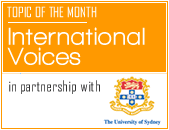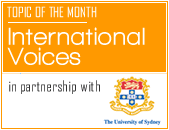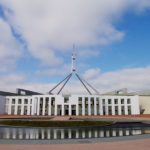Sinophobic One-Liners
Wang Hui | September 14, 2009

Since August, relatives and friends back in China have shown growing concerns about my family and I as we are now temporarily living in Sydney.
Even an uncle who lives in a remote county in the under-developed Shaanxi Province asked me to go back to China earlier. “China-Australia relationship is very lousy now, so you guys won’t be safe there,” he told me over the phone.
But as a journalist, I was fully aware of some alarming signals that the previously stable relationship between China and Australia could topple; well before the matter of Stern Hu broke out in early July.
In May, when Australia released its 2009 Defence White Paper, it sent an unmistakable message to the world. Australia plans to build up military force with unprecedented efforts, mainly due to the potential threat from China and India.
In June, Chinalco, a giant Chinese aluminum producer, lost to BHP in its bid to increase its stake in Rio Tinto. It’s noteworthy that Chinalco was never treated as an equal competitor from the very beginning. Australian politicians and opinion leaders built up a poisonous political atmosphere to ensure that Chinalco would not win.
The Chinese Government and media only expressed a restrained displeasure over the above two issues. This is understandable as Beijing always values much about its ties with major powers in the world while mainstream Chinese media are always sensible as not to stir-up trouble in the field of international relations.
 Despite these undercurrents, China-Australia ties had remained undisturbed on the surface during thses developments. However, when Stern Hu, Rio Tinto’s China head, was detained by Chinese authorities in early July for suspicion of espionage; a political storm gained force over the Pacific.
Despite these undercurrents, China-Australia ties had remained undisturbed on the surface during thses developments. However, when Stern Hu, Rio Tinto’s China head, was detained by Chinese authorities in early July for suspicion of espionage; a political storm gained force over the Pacific.Australia’s political sphere and mediascape responded immediately by whipping up the strongest anti-China chorus seen in years. They did not simply defend Hu but poured their criticism over China’s political, economic and social systems at will.
A country that has achieved long-term social and economic progress for more than 20 percent of the world’s population could not afford to be irresponsible when it accused an Australian citizen of possible wrongdoings within its territory. Hence, I have to conclude that some in this country were so ready to paint a black picture of China that they refused to wait for the entire story of Hu matter to be revealed.
Opinions and judgments can never be fair or accurate when they are based on incomplete information.
Unfortunately, this is not the end of the political tension fueled by the Sinophobic one-liners.
In retaliation to the Hu matter, Canberra granted a visa to Rebiya Kadeer, a leading Xinjiang separatist and an open enemy of the Chinese people. The move only pushed its relationship with Beijing to plunge deeper as it provoked one of the most sensitive nerves of Chinese domestic politics.
I have been watching all these scenarios with increasing worry and confusion.
In a broad sense, a tinted China-Australia relationship should be in no one’s interest. Even the welfare of ordinary people could be affected by full-blown political and economic tension.
When reading media stories now flooded with such words as “dictatorship”, “wolves” and “ruthless government” in reference to China and its government one becomes extremely uncomfortable. This practice could only reflect a deep-rooted bias in this country against China; a country Australia has formal diplomatic relationship with and could not afford to lose as an export market.
Australian concerns, when expressed in such unfriendly manners, would hardly be well received by any peoples; regardless of their political, social and cultural background. Mutual respect is the key to international relations and it must form the basis of the relationship between our two countries, with such different social and economic systems, if our communication is to be effective.
Wang Hui is Deputy Opinion Editor of The China Daily, China’s only nationwide English language newspaper. In a journalistic career spanning more than a decade she has commented widely on hot social and international issues. Wang Hui is the recipient of a 2009 Australian Leadership Award Scholarship and is currently studying for a Masters degree in media practice at the University of Sydney.
SHARE WITH:
















Pei
September 25, 2009 at 1:05 am
From long term relationship,
From long term relationship, China and Australia will rely more and more on each other. Just a temperary depress which is exactly someone’s expection, this can be seen a distraction of the public attention. It will be fine in 1 year probably. However, efforts need to be made from these two countries, especially on the side of Australia. Understand and respect are the key to these two countries.
zhigang1966
September 26, 2009 at 12:12 pm
A good piece!
Hui’s article makes a good reading! Effective communication is the key to addressing the current issues between Australia and China.
Thao
October 2, 2009 at 1:15 am
China needs to boost public diplomacy
The article has covered new developments in China – Australian relationships from communication perspective. Maybe the bilateral ties have been worsen due to such incidents, but I believe the two countries will still need each other because of strategic interests. I agree that mutual respect is important to any relation. Moreover, the principle of non-interference in a country’s internal affairs also needs to be observed.
In the information era, the media plays an important role in shaping the image of a state. Therefore, in my opinion, China should do more to approach Australian media and improve its image. That’s what we call "public diplomacy".